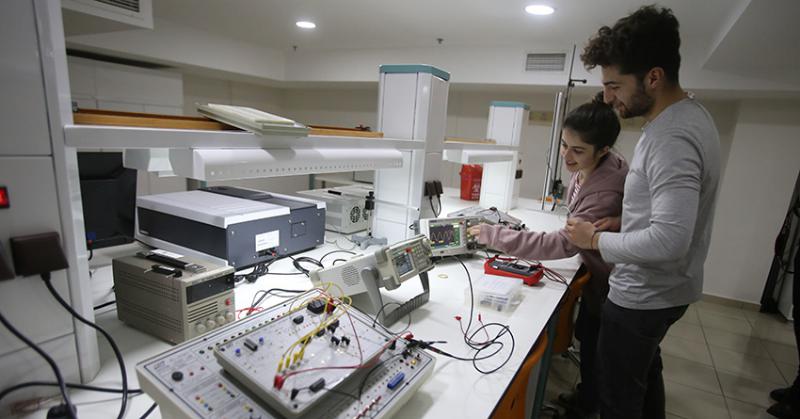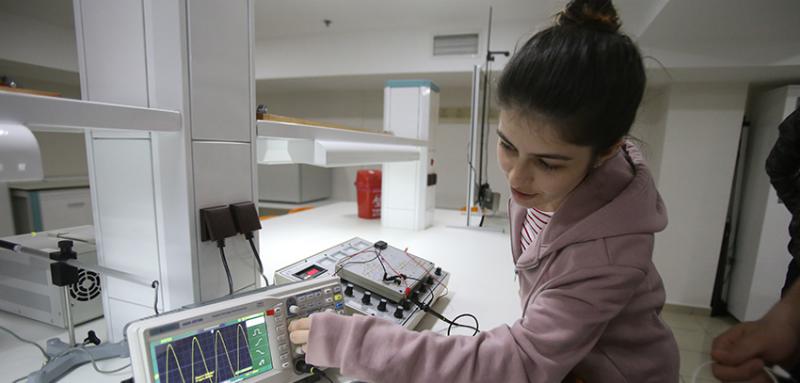What is Electrical - Electronics Engineering?
Electrical - Electronics Engineering provides the technologies that make up the information society. Electrical - Electronics Engineering directly affects the quality and comfort of everyday life by providing the required high technology. Electrical - Electronics Engineering is the driving force of many innovations and discoveries in other fields of science and technology as well. Electrical - Electronics Engineering is the foundation of the fields such as electronic circuits, control systems, biomedical systems, energy systems (production, transmission, distribution), communication, automation, computation, storage and transfer of information, etc. Mobile communication, electronic commerce, computers, and the Internet that are widely used today are also the main subjects of Electrical - Electronics engineering. The role of Electrical - Electronics Engineering in future technological developments is indisputable.
Electrical - Electronics Engineering is the Profession of the Future
Mobile communication, electronic commerce, computers, and the internet, which are widely used today, are among the main topics of electrical - electronics engineering. It is known that Electrical - Electronics Engineering, which has a very important function in many different areas of life, will have a much more important role in the future with the rapidly developing technology.

Electrical - Electronics Engineering Covers a Wide Area
Today, electrical-electronic engineering is needed in many different disciplines, from medicine to communication, from computer technologies to the Internet and to space research. For example, modern diagnostics and treatment techniques in medicine require the contribution of electrical-electronics engineering. Applications having “smart” as a prefix such as smart homes, smart roads, smart cities, etc. can never be considered without Electrical - Electronics engineering. The automation systems and robots used in various fields of industry are mainly within the application areas of Electrical - Electronics Engineering. In summary; the electrical-electronics engineer not only establishes the infrastructure of the information age but also solves the problems encountered in other fields of science and engineering.
Aims to Train Fully Equipped Electrical-Electronics Engineers
There is a growing need in our country for engineers who have gained a solid scientific and technical background that will enable them to research, plan and execute their design development, production, and implementation phases by adapting to worldwide rapid technological development in the international electronics sector and following new technological developments. In line with these needs, Üsküdar University Department of Electrical-Electronics Engineering is aimed to be facilitated in order to educate electrical-electronics engineers and contribute to Turkey’s electrical-electronics industry, which is experiencing rapid technological development.
The need for engineers with the knowledge and skills to adapt to the rapid development in electrical-electronics is increasing day by day. In line with these needs, Üsküdar University aims to graduate electrical-electronics engineers with cutting edge skills who can contribute to technological development at national and international level.
The Department of Electrical-Electronics Engineering primarily aims to establish a strong infrastructure in mathematics, basic sciences and basic engineering. To be more specific; it is aimed to identify the engineering problems in the field of electrical-electronics and find solutions by thinking analytically in the related disciplines. Apart from these, our students will be able to effectively use the necessary techniques, equipment and modern communication tools for day-to-day engineering applications. The most obvious advantage of our program is the ability to access the capacity to work in multi-disciplinary fields by exploiting the various departments in our Faculty of Engineering and Natural Sciences.

Electrical-Electronics Engineering Laboratory Equipment
The Electronic Circuits Laboratory has been furnished in order to practically apply the electrical and electronic circuit knowledge that students have learned theoretically and to perform circuit simulations in the computer environment. There are various resistors, capacitors, logic gates and similar experimental components to be used in experiments. The Digital Systems Laboratory aims to understand the logic of logic gates, It is designed to design logic circuits with various techniques and carry out advanced digital system experiments. In our laboratory, digital chip design concepts are taught to students primarily with Verilog HDL software. In addition, digital system kits have a 4-core Arm processor and it is possible to perform Linux-based microprocessor experiments. In addition, thanks to the "Power Systems and Electrical Machines Laboratory", students will gain practice in the maintenance operations and designs of power systems, electrical machines and renewable energy systems. They will also use this laboratory in their graduation projects. The laboratory will also provide an environment where graduate students can implement advanced projects such as motor controllers, solar energy applications and power electronics applications and provide them with the opportunity to advance their professional experiences. Undergraduate students do their graduation thesis in the Electrical and Electronics Engineering Research & Project Laboratory.
4-Year Undergraduate Program is Applied
The duration of the study is 8 semesters except one year for the English preparatory class. The education language is 100% English. Once the program is complete, the graduate program is available.
Opportunities for Electrical - Electronics Engineering Graduates
The courses offered by the department forms the foundation for the following disciplines, which are the application fields of electrical-electronic engineering. Electrical - Electronics Engineering graduates can find job opportunities in the following areas:
- Computer systems and communication networks
- Mobile communication and wireless networks
- Optical and microwave communication
- Integrated circuit design and micro-electronic systems
- Advanced robots and intelligent machines
- Video and image processing systems
- Quantum devices and quantum computation
- Electromagnetic compatibility
- Renewable energy systems
- Space research and technology
- Antennas and propagation
- Internet of Things (IoT)
- Artificial intelligence
- Cloud computing
- Sensor networks
- Biomedical systems


